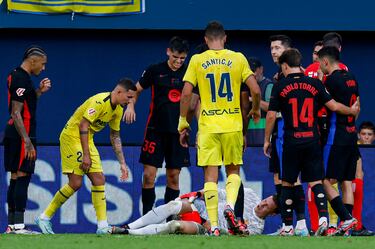Can Barcelona sign a replacement for injured Marc-André ter Stegen?
After suffering a serious knee injury, Barça goalkeeper Marc-André ter Stegen is facing a lengthy spell on the sidelines.

After goalkeeper Marc-André ter Stegen suffered a serious injury at the weekend, Barcelona must now decide whether to hand the gloves to back-up custodian Iñaki Peña, or dip into the market.
Although the transfer window is closed in Spain, the club can sign a replacement for Ter Stegen right away - but only certain players would be available to the Catalans, and there would be a limit on how much they could spend.
Ter Stegen facing lengthy injury layoff
Ter Stegen was stretchered off in tears during Sunday’s 5-1 LaLiga win over Villarreal, and on Monday Barça confirmed that the German has ruptured his right patellar tendon. He is expected to be out of action for around eight to nine months.
Who could Barça sign to replace Ter Stegen?
Despite the closure of the transfer window on August 31, Spanish Football Federation (RFEF) rules permit the club to sign and register a new keeper now - as long as two conditions are met. He must arrive as a free agent, and has to have terminated his contract with his previous club before deadline day.
And although Barça are currently over the salary cap imposed on the club by LaLiga’s financial fair play rules, this state of affairs would not prevent them from replacing Ter Stegen.
If doctors confirm that a player is to be ruled out by injury for more than four months, the league allows teams to give his replacement a salary up to 80% as great as that earned by the injured individual - regardless of the club’s wage-cap status. Ter Stegen is on €9 million a year, so Barça would be able to spend around €7 million on a new keeper’s annual pay packet.

No repeat of 2020 Braithwaite deal
Previously, Barça would have been able to replenish their squad by making an emergency signing from another Spanish club, as they did four years ago when they brought in Danish forward Martin Braithwaite from Leganés.
Until a recent rule change, the RFEF allowed clubs to fill the void left by a long-term casualty by making an outside-of-the-transfer-window purchase from a team within the same country. This avenue typically led the buying club to pay the player’s release clause, given the selling team’s understandable reluctance to agree a deal. After all, the latter club was left a man down and couldn’t replace him.
This is what happened in February 2020, when Barça reacted to a serious injury to Ousmane Dembélé by paying Braithwaite’s Leganés buy-out fee. Los Pepineros were deprived of their star striker midway through the season, and ended up being relegated from the Spanish top flight.
Related stories
In the wake of the controversial transfer, the RFEF gained permission from both FIFA and the Spanish government’s National Sports Council to abolish this rule. Since the 2020/21 season, LaLiga clubs have no longer been allowed to pull off such smash-and-grab moves.


Complete your personal details to comment